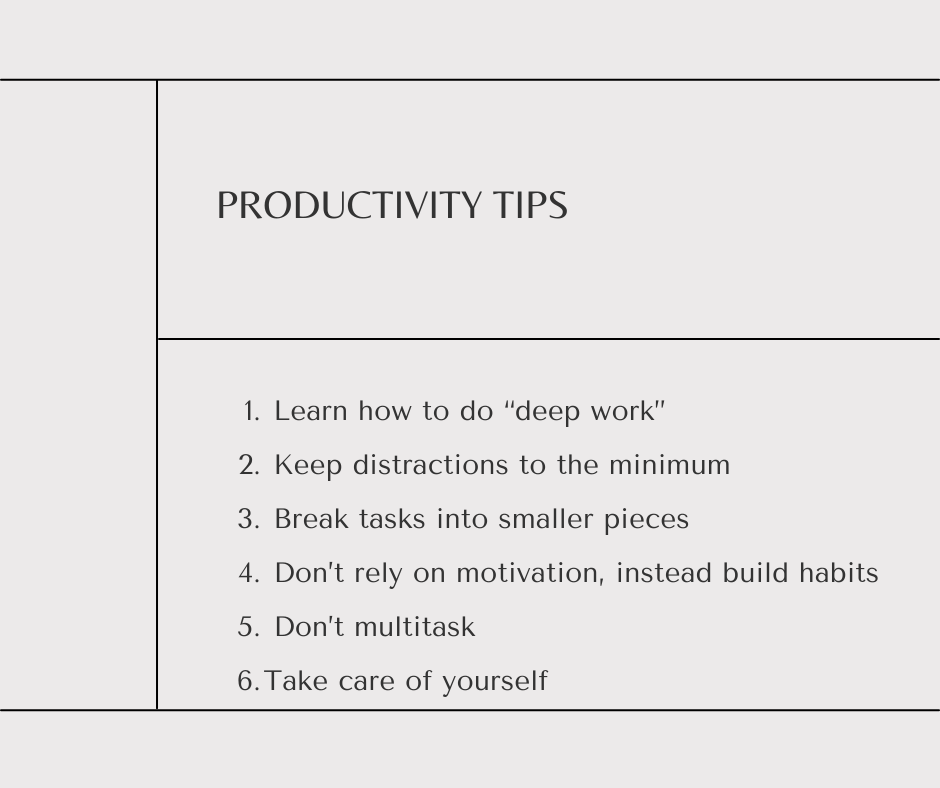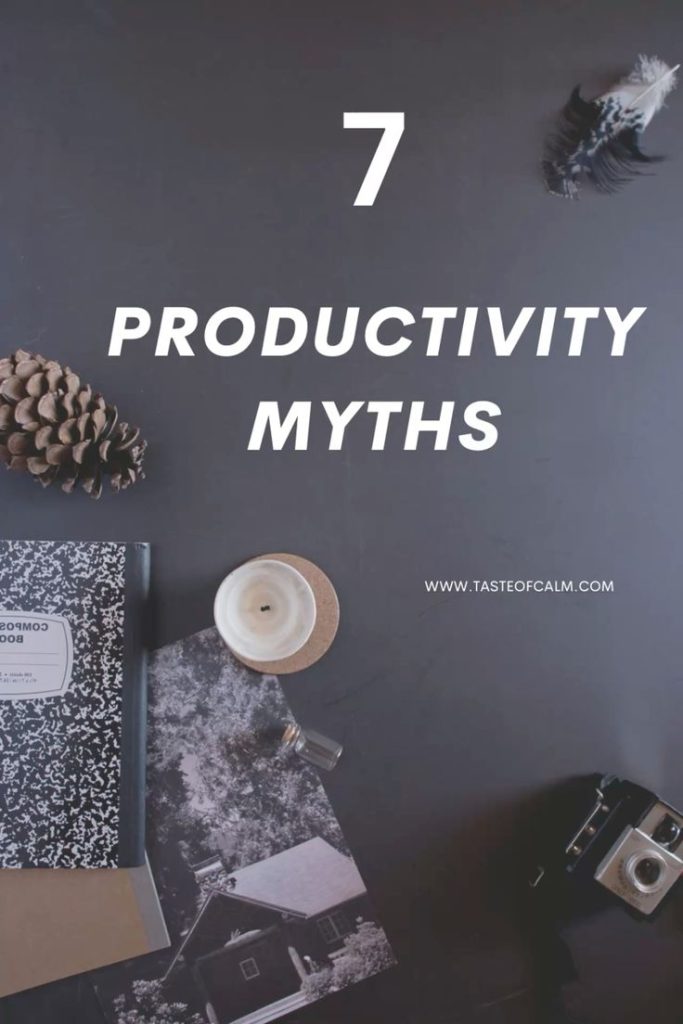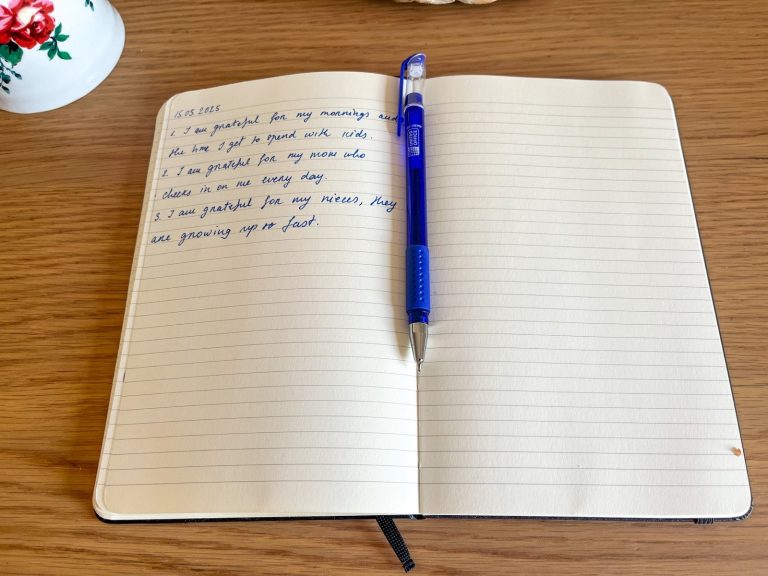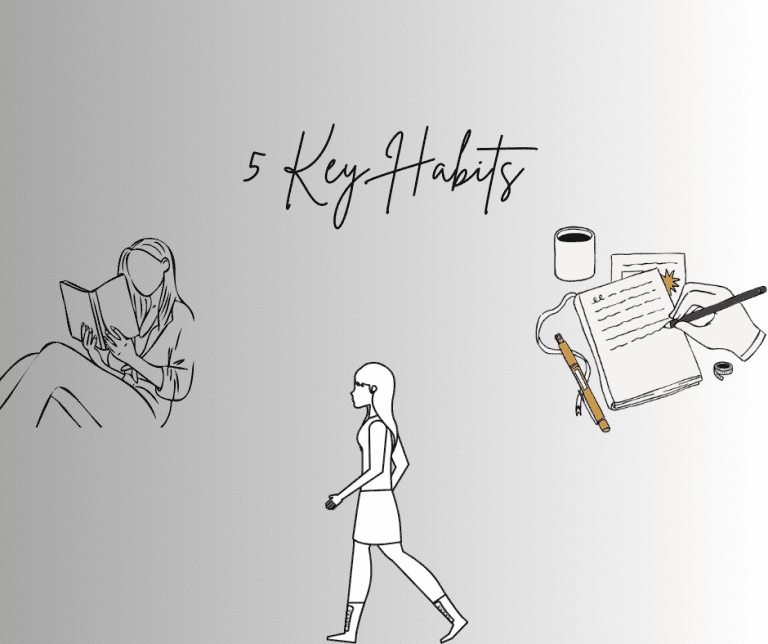7 Productivity Myths
We live in a culture that is obsessed with productivity. But in the pursuit of getting more done in less time, many of us fall prey to widely accepted “truths” about productivity that are, in fact, counterproductive. Productivity myths can derail our efforts, sap our energy, and leave us feeling less accomplished.
To be productive, you must focus on the right tasks in the right way. It’s not just about being busy and working hard, it is about correct prioritization and ability to
Productivity that you can maintain over a longer period of time only comes from leading a balanced life. Otherwise, it leads to complete burnout. It leads to you quitting whatever business you started and idea you wanted to develop.
In the age of AI, you need to optimize for creativity, not productivity. You need to make sure to eat well, train daily, go on walks, get enough sleep, and socialize. You need to understand that 4 hours of focused work gives much higher results than 12 hours of distracted work.
There are a lot of articles online offering new answers for how to be productive, or the same answer repackaged in a new way. And yet, no matter how many articles we read, most of us feel stuck in the same bad habits. One of the challenges is that it takes time to build habits that lead to greater productivity.
But a big part of the problem is that a lot of the advice out there just isn’t helpful and can even be counter-productive.
Let’s debunk some of the most persistent productivity myths and explore more effective alternatives.
7 Productivity Myths
Copy Successful People
We can often find a lot of advice online about how famous people work. We read they get up at 5 am, exercise, and work, and we often believe that if we just copy them we will be successful too.
Well, there are a couple of problems here. First, successful people have a lot of help. From maids, cleaners, cooks, nannies you name it. So while they can focus on getting up early, exercising, and working….the rest of us are getting the kids to school, preparing breakfast, and cleaning up.
So what you read online has a background that we often do not see.
The second problem is that any routine has to work for your life. Do you have kids? Can you get to bed by 9 pm or are you picking up kids from practice?
Also, studies have shown that a lot of people cannot work as focused that early. So you really need to test this. And find the routine that works best for you.
What you should do instead
Get inspired by the people you admire, experiment with their productivity approaches, emulate the ideas that really help you work better, and throw out the rest.
Work hard all day
Our society glorifies working hard and staying at work till late in the evening.
They fail to realize that one person can work 12 hours a day and make $80K a year, while person B can work 1 hour a day and make $5 million. The difference is focus, skill, and understanding. Not how hard, long, or organized your work.
In fact, trying to be a machine that works nonstop isn’t in line with human nature. According to “deep work” expert Cal Newport and other studies, we have about 3 to 4 highly productive hours in us each day.
By keeping ourselves busy all day with insignificant tasks, we fail to utilize these highly productive hours, and instead, our work remains shallow.
What you should do instead
The secret to productivity lies in working efficiently and focusing, not in the working hours. You need to disconnect the hours that you spend working from the results that you generate.
If you are busy all day and you are not achieving the goals you have, then think long and hard about how to increase the quality of your work and reduce the number of hours you spend working.
Optimize your routine so that you can spend at least 2 hours in tightly focused work, but also include downtime that will help you rest, focus, and come up with new ideas.

Be always busy
The fact that we are always busy does not mean we are productive and we are working towards our most important goals.
Most of the time, people who are always busy are also the ones who are working towards increasing other people’s success, not their own.
You can have 10 items on your daily to-do list, but if none of them is relevant, you are not getting closer to achieving your goals.
If you indeed find yourself busy all the time, then you need to carefully study your to-do list and learn how to prioritize correctly.
What tasks are not important, and what tasks you can delegate to someone else? And what you really need to focus on, and spend your energy on.
What you should do instead
Are you truly busy or are you spending a lot of time on distractions without realizing it?
Sitting at your computer all day does not mean you are productive and hard-working. If you are spending hours listening to podcasts and YouTube videos while working, then you need to be real about your “business”.
My advice here is to closely monitor and write down your “online” behavior. People get really surprised when they realize how many hours per day they spend scrolling and consuming content.
Multitasking increases productivity
People still believe that multi-tasking allows you to accomplish more in less time.
What do they forget about? The quality of the work.
As you are sitting at your computer, typing emails, listening to a podcast, and chatting with a couple of friends, the quality of your work is poor. You can only perform shallow tasks this way.
But if you were to sit down and focus exclusively on emails, you would do much better work in significantly less time.
Multitasking reduces the quality of your work, but it also tires your brain and then when you need to focus you are unable to.
Social media, computers, and smartphones, all destroyed the quality of our work and the ability to focus and perform “deep work“.
I now try to focus on one task at a time. I also try to give myself rest from multitasking even when doing housework.
What you should do instead
Focus on one task at a time and remove all distractions. Find the best time for your most focused work, and for most people these are mornings.
Turn off your phone, block social media on your computer, and start working. You will be surprised how much efficient you are, and how many ideas you can come up with when you are not distracted.
Rest is a waste of time
Even weekends now need to be productive. There are many tips online on how to be productive on weekends, and how to reset your life for the week ahead.
But actually, you need that downtime to be focused and productive next week.
Rest is a prerequisite of dedicated focused work.
You need to sharpen the saw before you can cut down the tree. Overtiring yourself just gives you poor results, and then you wonder why all that work is not giving any results, and is not getting you closer to your goals.
What you should do instead
Prioritize self-care. When you get up in the morning, think about exercise, food, and mindset as necessary tools in your productivity quest.
Without them, there is now peak performance and no peak productivity.
When you feel good, you can work in a focused and dedicated way.
So always make sure to first take care of yourself, and then sit down to work.
Set big goals
It often seems that the people who set the most ambitious goals are the most successful. And the advice is that you need to think big in order to become successful. But is it always so?
It can often seem like the people who set the most ambitious goals are the most successful.
However, a group of studies has shown that focusing heavily on goals (in activities as varied as exercising on a treadmill, creating origami, flossing, and practicing yoga) was correlated with dropping out earlier.
In fact, big goals that often seem unreachable can demotivate you, and you can stop working on achieving them.
What you should do instead
Instead, the advice is to start with really small goals. Something that is achievable and that you can do consistently until you make the habit stick.
Basically, the more bite-sized the tasks are, the easier it is to create a routine that you stick to. Eventually, these small tasks will amount to something big.
Motivation is key to productivity
One of the biggest productivity myths is that you need to work on your motivation in order to be productive. But the problem is that motivation is fleeting and unreliable. Waiting until you feel motivated to start a task often leads to procrastination.
Instead, you need to go through with the task even when you do not feel motivated.
This will enable you to build a lasting habit. And let’s be honest, we are not motivated every day to brush our teeth or wash our face.
But we do it anyway, as it becomes a part of our routine.
Being productive means pushing through the hard moments. Especially when you feel down, unmotivated, and uninspired.
Even if this is 5 minutes of work, you have to do it to keep the streak going.
What you should do instead
Build discipline and develop habits that make starting easier. Break tasks into smaller, manageable steps, and use momentum to keep you going once you’ve begun.
Final Thoughts

Being productive does not mean copying someone else’s routine to the letter, and forcing yourself to be busy all day.
Productivity is about more than crossing tasks off a to-do list. It’s about making meaningful progress toward your goals while maintaining your well-being.
Striving for balance is key: overworking and perfectionism can be as counterproductive as procrastination. True productivity comes from understanding your priorities, aligning your efforts with your values, and respecting your need for rest.
Remember, a balanced approach doesn’t just lead to better results; it also fosters sustainability and fulfillment in the long run. By debunking myths and embracing a healthier perspective on productivity, you can work smarter, live better, and achieve success without sacrificing your peace of mind.







